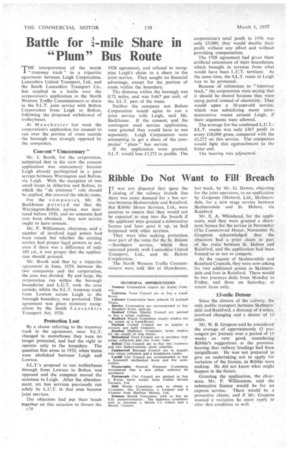Battle for 4-mile Share in "Plum" Bus Route
Page 62

If you've noticed an error in this article please click here to report it so we can fix it.
'THE interpretation of the words "tramway track" in a tripartite agreement between Leigh Corporation, Lancashire United Transport, Ltd., and the South Lancashire Transport Co., has resulted in a battle over the corporation's application to the North Western Traffic Commissioners to share in the S.L.T. joint service with Bolton Corporation from Leigh to Bolton, following the Proposed withdrawal of trolleybuses.
At Manchester last week the corporation's application for consent to run over the portion of route outside the borough was strongly opposed by the companies.
Consent "Unnecessary"
Mr, J. Booth, for the corporation, submitted that in his view the consent application was unnecessary because Leigh already participated in a joint service between Warrington and Bolton, via Leigh. With the exception of two small loops in Atherton and Bolton, to which the "de rninimus " rule should be applied, this covered the whole route.
For the corn panics, Mr. H. Backhouse p oin t e d out that the Warrington-Bolton service was instituted before 1930, and no consents had ever been obtained. Any new service ought to have consent.. .
Mr. F. Williamson, chairman, said •a number of involved legal points had+ been raised, but whether the existing service had proper legal powers or not, even if there was a difference of only 100 yd., it was proper that the application should proceed.
Mr. Booth said that by a tripartite agreement in June, 1929, between the two companies and the corporation, the area was divided. By and large, the corporation ran within the borough boundaries and LILT. took the area outside, whilst the S.L.T. tramway track from Lowton across Leigh to the borough boundary, was protected. This agreement was given statutory recognition by the South Lancashire Transport Act, 1929.
Protection Lost By a clause referring to the tramway track in the agreement, once S.L.T. changed to motorbuses they were no longer protected, and had the right to operate only to the boundary. The question first arose in 1933, when trams were abolished between Leigh and Lowton.
S.L.T.'s proposal to run trolleybuses through from Lowton to Bolton was opposed and the company moved the terminus to Leigh. After the abandonment, six bus services previously run solely by L.U.T. in that area became joint services.
The objectors had put their heads together on this occasion to thwart the (170 1928 agreement, and refused to recognize Leigh's claim to a share in the joint service. They sought no financial advantage, except for the portion of route within the boundary.
The distance within the borough was 0.72 miles, and was 9.467 per cerits of the S.L.T. part of the route.
Neither the company nor Bolton Corporation would agree to run a joint service with Leigh, said Mr. Backhouse. If the consent, and the contingent road service application, were granted they would have to run separately. Leigh Corporation were attempting to get a share of the companies' " plum " bus service.
If the application were granted, S.L.T. would lose £3,272 in profits. The corporation's total profit in 1956 was only £3,000; they would double their profit without any effort and without providing compensation. .
The 1928 agreement had given them artificial extensions of their boundaries, which brought in revenue from what would have been L.U.T. territory. At the same time, the S.L.T. route in Leigh was to beprotected.
Because of references to "tramway track," the corporation were saying that it should be shared because they were using petrol instead of electricity. They would upset a 30-year-old service, which was subsidizing many unre-. muncrative routes around Leigh, if their arguments Were allowed.
The average for the combined L.U.T.S.L.T. routes was only £367 profit in every £10,000. gross, compared with the £3,272 on this service. The companies would fight this 9croachment to the bitter end.
The hearing was adjourned.












































































































